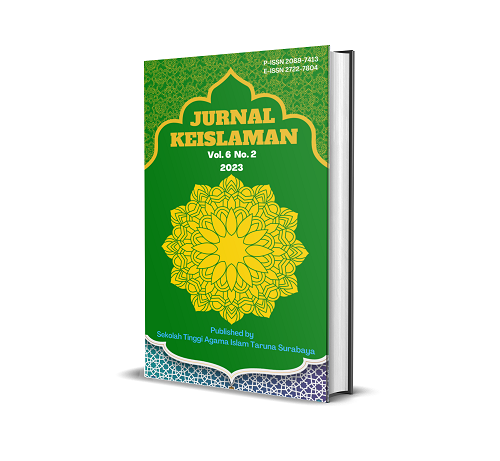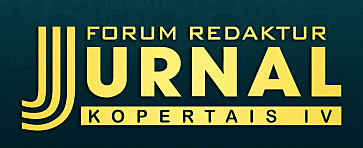The Islamic Values and Democratic Ideals Navigating the Intersection of Islam and Democracy
Abstract
The debate about democracy and Islam has consistently been juxtaposed as if it never reaches a final resolution, leading to disharmony between pro and con camps in relation to democracy, especially in the contemporary era. This study elucidates that there is no need for a dichotomy between democracy and the discourse of the Quran, as the Quranic vision is not contradictory to the spirit of democracy. This research is conducted based on direct observation, taking into account empirical evidence from literature and phenomena occurring within society. The study concludes that such debate is not of paramount importance; rather, what is more urgent is fostering public participation capable of implementing democracy that aligns with the vision of the Quran and Islam at large, to prevent all forms of injustice, authoritarianism, intolerance, and oppression.References
Abulatefa, Dima F. T., and Siti Fatimah Salleh. “THE DILALECTIC OF SHURA (CONSULTATION) AND DEMOCRACY IN THE CONTEMPORARY ISLAMIC THOUGHT (جدلية الشورى والديمقراطية ÙÙŠ الÙكر الإسلامي المعاصر ).†Malaysian Journal Of Islamic Studies (MJIS) 3, no. 2 (July 29, 2019): 121–32.
Amri, Khairul. “SOSIOHISTORIS MASYARAKAT ARAB PRA ISLAM.†JURNAL MUMTAZ 2, no. 1 (January 7, 2022): 1–7.
Azizah, Nur, and Khoirul Umami. “Sighnifikansi Ayat Tentang Konsep Demokrasi di Indonesia dalam Qs. Ali Imran Ayat 159 (Pendekatan Pembacaan Kontekstual Nashr Hamid Abu Zayd).†Ibn Abbas : Jurnal Ilmu Alquran dan Tafsir 5, no. 1 (August 11, 2022). https://doi.org/10.30821/jia.v5i1.12557.
Barton, Greg, Ihsan Yilmaz, and Nicholas Morieson. “Authoritarianism, Democracy, Islamic Movements and Contestations of Islamic Religious Ideas in Indonesia.†Religions 12, no. 8 (August 2021): 641. https://doi.org/10.3390/rel12080641.
Bunzel, Cole. “Ideological Infighting in the Islamic State.†Perspectives on Terrorism 13, no. 1 (2019): 12–21.
Butt, Prof Dr Khalid Manzoor, and Naeema Siddiqui. “Compatibility between Islam and Democracy.†South Asian Studies 33, no. 2 (May 10, 2020). http://111.68.103.26/journals/index.php/IJSAS/article/view/3180.
Ciftci, Sabri. “Islam, Social Justice, and Democracy.†Politics and Religion 12, no. 4 (December 2019): 549–76. https://doi.org/10.1017/S1755048318000810.
Clark, Jeff. “Philosophy, Understanding and the Consultation: A Fusion of Horizons.†British Journal of General Practice 58, no. 546 (January 1, 2008): 58–60. https://doi.org/10.3399/bjgp08X263929.
El Fadl, Khaled Abou. “Islam and the Challenge of Democratic Commitment.†Fordham International Law Journal 27 (2004 2003): 4.
———. “Islam and the Theology of Power.†Middle East Report, no. 221 (2001): 28–33. https://doi.org/10.2307/1559337.
———. “Tensions in Tradition: Hadith, Gender, and Reasonable Interpretation.†UCLA Journal of Islamic and Near Eastern Law 19 (2021): 1.
Esposito, John L. “Political Islam and the West.†NATIONAL DEFENSE UNIV WASHINGTON DC CENTER FOR COUNTERPROLIFERATION RESEARCH, January 1, 2000. https://apps.dtic.mil/sti/citations/ADA426734.
Fadl, Khaled Abou El. “Qurʾanic Ethics and Islamic Law.†Journal of Islamic Ethics 1, no. 1–2 (July 27, 2017): 7–28. https://doi.org/10.1163/24685542-12340002.
Faiz, Fahruddin. “KOMPATIBILITAS DEMOKRASI DAN ISLAM DALAM PERSPEKTIF KHALED ABOU EL-FADL†03, no. 02 (2013): 18.
Farooq, Omar, and Khondker Aktaruzzaman. “Religiosity and Perception About Compatibility of Democracy With Islam: Evidence From the Arab World.†International Journal of Public Opinion Research 31, no. 2 (June 1, 2019): 266–82. https://doi.org/10.1093/ijpor/edy011.
Fukuyama, Francis. “The End of History?†The National Interest, no. 16 (1989): 3–18.
Gerring, John, Tore Wig, Wouter Veenendaal, Daniel Weitzel, Jan Teorell, and Kyosuke Kikuta. “Why Monarchy? The Rise and Demise of a Regime Type.†Comparative Political Studies 54, no. 3–4 (March 1, 2021): 585–622. https://doi.org/10.1177/0010414020938090.
Haqqi, Abdurrahman Raden Aji. “RELIGIOSITY IN CRIMINAL LAW: ISLAMIC PERSPECTIVE.†Diponegoro Law Review 4, no. 1 (April 30, 2019): 1–20. https://doi.org/10.14710/dilrev.4.1.2019.1-20.
Heck, Paul L. The Intolerance of Rationalism: The Case of al-JÄḥiz in Ninth-Century Baghdad. Brill, 2019. https://doi.org/10.1163/9789004411500_018.
Hidayat, M. Taufiq, Yusuf Rahman, and Kusmana Kusmana. “Al-Qur’an And Radical Ideology; A Critical Study of ‘Al-Wa’ie’ Tafsir by Rokhmat S. Labib.†Jakarta, Indonesia, 2021. https://doi.org/10.4108/eai.20-10-2020.2305172.
Joustra, Robert J., and Jessica R. Joustra. “Are Calvinists for Pluralism?: The Politics and Practice of a Protestant Possibility.†In The Routledge Handbook of Religious Literacy, Pluralism, and Global Engagement. Routledge, 2021.
Katz, Marion. “Gender and Legal Fluidity.†Locating the Sharīʿa, January 30, 2019, 46–62. https://doi.org/10.1163/9789004391710_005.
Kenney, Jeffrey T., and Ebrahim Moosa. Islam in the Modern World. Routledge, 2013.
Mahmuddin, Mahmuddin. Akar-Akar Dan Doktrin Ideologi Islamisme Di Dunia Islam. Samata: Fakultas Ushuluddin dan Filsafat, 2019. http://repositori.uin-alauddin.ac.id/14059/.
Maram, Ahmad Nabilul. Nalar Ideologi Politik Hasan Al-Turabi Dalam Tafsir Al-Tawhidi. CV. Pena Jaya Pers, 2023. https://penajaya-pers.com/product-tag/tafsir-al-tawhidi/.
Menchik, Jeremy, and Thomas B. Pepinsky. “Islam, Identity, and the Organizational Roots of Political Tolerance.†SSRN Scholarly Paper. Rochester, NY, August 15, 2018. https://doi.org/10.2139/ssrn.3232834.
Mostafa Hassan, Mohamed El Khayat, Salleh Siti Fatimah, and Abulatefa Dima F. T. “The Dilalectic of Shura (Consultation) and Democracy in the Contemporary Islamic Thought.†Malaysian Journal for Islamic Studies 3, no. 2 (August 2019): 121–32.
Muchsin, Misri Abdul, and Abdul Manan. “HISTORICAL DEVELOPMENT OF TAX DURING THE EARLY ISLAMIC PERIOD: JIZYAH AND KHARAJ: A Historical Analysis.†Journal of Al-Tamaddun 14, no. 2 (December 17, 2019): 1–7. https://doi.org/10.22452/JAT.vol14no2.1.
Mughniyah, Muhammad Jawad. Fiqih Lima Mazhab: Ja‘fari, Hanafi, Maliki, Syafi‘i, Hambali (Gold Edition). Shaf, 2015.
Mujahidin, Anwar. “The Dialectic of Qur’an and Science: Epistemological Analysis of Thematic Qur’an Interpretation Literature in the Field of Social Sciences of Humanities.†ESENSIA: Jurnal Ilmu-Ilmu Ushuluddin 19, no. 2 (October 23, 2018): 209–27. https://doi.org/10.14421/esensia.v19i2.1563.
Nurhasan, Nurhasan, and Siti Ngainnur Rohmah. “Analysis of the Comparative Western Democracy, Pancasila Democracy, and the Concept of Shura; Study of the Book Manuscript ‘Democracy in Islamic Perspective by Ahmad Sukardja and Ahmad Sudirman Abbas.’†JOURNAL of LEGAL RESEARCH 3, no. 2 (May 6, 2021): 253–72. https://doi.org/10.15408/jlr.v3i2.20620.
Razif, Nur, and Mohd Syakir Mohd Rosdi. “Muslim Political Figure: A Study on the Political Practices of Khalifah Umar Abdul Aziz.†International Journal of Academic Research in Business and Social Sciences 8 (October 30, 2018). https://doi.org/10.6007/IJARBSS/v8-i10/4721.
Ridho, Miftahur. “Peristiwa Tahkim (Polemik Perselisihan Politik Dan Implikasinya).†HUMANISTIKA : Jurnal Keislaman 5, no. 1 (January 1, 2019): 57–71. https://doi.org/10.36835/humanistika.v5i1.147.
Ruiz Ibáñez, José Javier, and Gaetano Sabatini. “Monarchy as Conquest: Violence, Social Opportunity, and Political Stability in the Establishment of the Hispanic Monarchy.†The Journal of Modern History 81, no. 3 (September 2009): 501–36. https://doi.org/10.1086/599270.
Saenong, Ilham B. “Hermeneutika Al-Qur’an Untuk Pembebasan : Telaah Kritis Pemikiran Hassan Hanafi.†Millah: Jurnal Studi Agama, 2004, 255–75.
Sahri, Sahri. “Political Thought of Al-Ghazali on Imamah: Debate between Theocracy and Democracy.†HTS Teologiese Studies / Theological Studies 77, no. 3 (August 7, 2021). https://www.ajol.info/index.php/hts/article/view/212137.
Said, Imam Ghazali. Tiga ulama idola kaum Fundametalis. Imtiyaz Surabaya, 2019. http://repository.uinsby.ac.id/id/eprint/1111/.
Sirry, Mun’im A. “Early Muslim–Christian Dialogue: A Closer Look at Major Themes of the Theological Encounter.†Islam and Christian–Muslim Relations 16, no. 4 (October 1, 2005): 361–76. https://doi.org/10.1080/09596410500252327.
Soroush, Abdolkarim, and ʻAbd al-Karīm Surūsh. Reason, Freedom, and Democracy in Islam: Essential Writings of Abdolkarim Soroush. Oxford University Press, 2002.
Sukri, Alfahjri. “NEGARA DALAM PEMIKIRAN MOHAMMAD NATSIR.†JURNAL AL-AQIDAH 11, no. 2 (December 1, 2019): 118–31. https://doi.org/10.15548/ja.v11i2.1416.
Syarif, Nurrohman. “Islam Dan Masalah Kenegaraan: Menimbang Posisi Syariat Di Negara Demokrasi Indonesia.†edited by Cik Hasan Bisri, 1–31. Bandung: Pusat Penelitian dan Penerbitan ,LP2M ,UIN, Sunan Gunung Djati,Bandung, 2018. https://digilib.uinsgd.ac.id/18341/.
Taufiq, M., and Muhammad Ilham. “Pemikiran Hermeneutika Khaled M. Abou El Fadl: Dari Fikih Otoriter Ke Fikih Otoritatif.†TAQNIN: Jurnal Syariah dan Hukum 3, no. 1 (July 7, 2021). https://doi.org/10.30821/taqnin.v3i01.9514.
Thaha, Idris. Demokrasi religius: pemikiran politik Nurcholish Madjid dan M. Amien Rais. Teraju, 2005.
Usman, Abur Hamdi. “Does Islam Practice Tolerance? Some Notes from Quranic Perspective,†July 19, 2018. https://doi.org/10.20944/preprints201807.0366.v1.
Wibawa, Agung. “SALAFIYYUDIN REFUTATION TOWARD YUSUF AL QARDHAWI CONCEPT OF DEMOCRACY.†Metakom 4, no. 2 (September 30, 2020): 47–60. https://doi.org/10.23960/metakom.v4i2.102.
Yousif, Ahmad. “Islam, Minorities and Religious Freedom: A Challenge to Modern Theory of Pluralism.†Journal of Muslim Minority Affairs 20, no. 1 (April 1, 2000): 29–41. https://doi.org/10.1080/13602000050008889.
Zaji, Researcher Sarah Abdul Razzaq, and Assist Prof Dr Tofeek Daway Al-Hajjaj. “Religious and Historical Text in the Books of Royal Literature during the First Abbasid’s Era.†ADAB AL-BASRAH 98, no. 1 (2021). https://www.iasj.net/iasj/article/231097.
Copyright (c) 2023 Ahmad Nabilul Maram, M. Ridlwan Nasir, Husein Aziz

This work is licensed under a Creative Commons Attribution-ShareAlike 4.0 International License.
Authors who publish with this journal agree to the following terms:
- Authors retain copyright and grant the journal right of first publication with the work simultaneously licensed under a Creative Commons Attribution-ShareAlike that allows others to share the work with an acknowledgement of the work's authorship and initial publication in this journal.
- Authors are able to enter into separate, additional contractual arrangements for the non-exclusive distribution of the journal's published version of the work (e.g., post it to an institutional repository or publish it in a book), with an acknowledgement of its initial publication in this journal.
- Authors are permitted and encouraged to post their work online (e.g., in institutional repositories or on their website) prior to and during the submission process, as it can lead to productive exchanges, as well as earlier and greater citation of published work (See The Effect of Open Access).






















